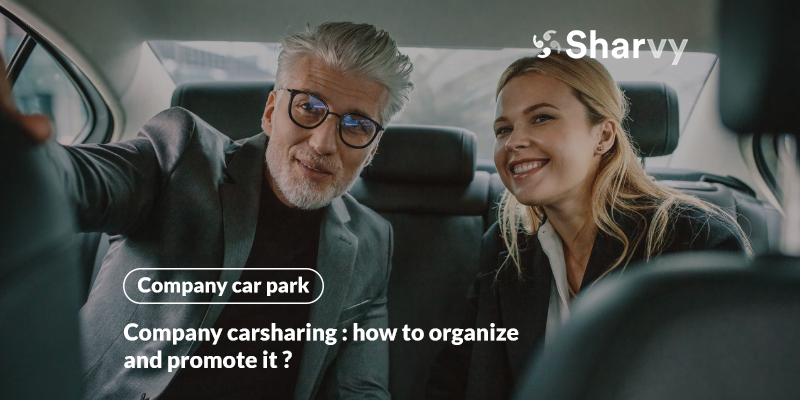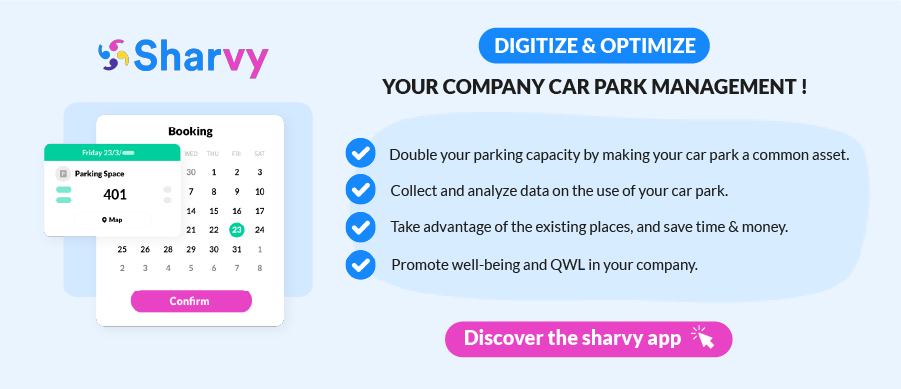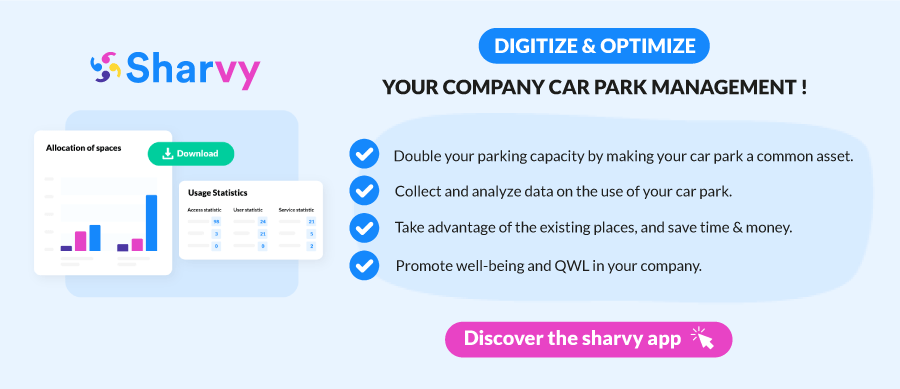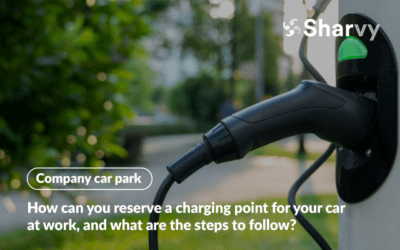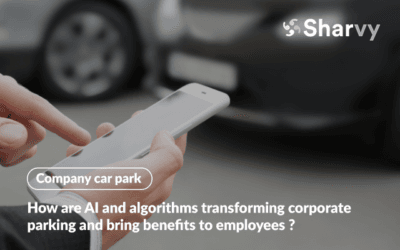The subject of sustainable mobility has been at the heart of the ecological transition and is gradually gaining a place of choice in companies’ decision-making.
However, there is still a lot of progress to be made, especially concerning the home-work journey. And for a good reason, a VINCI Autoroutes study in autumn 2021 reveals that at 8 am, more than 89% of cars carry only one person. As a result, it can be seen that it is at the time when it is most penalizing, i.e., during rush hour, that the rate of self-sufficiency is the highest.
Faced with this observation, and to reverse this tendency, the solution of daily carsharing appears obvious within the companies. Focus on this article!
What is carsharing & how does it work?
Before continuing, let us recall carsharing consists of making a journey in common with one or more people in the same vehicle.
To undertake it, users can choose to organize themselves if they know each other. Or, they can go to a carsharing website that promotes the connection between drivers and passengers. Like BlaBlaCar, Klaxit, or Karos. On the latter, they can quickly post an ad to offer to take passengers to the same place. Or, conversely, look for a driver and thus share the costs of the journey (gas, tolls, parking, etc.).
The implementation of company car-sharing initiatives is therefore facilitated by the use of these dedicated platforms, enabling employees to find compatible car-sharing partners in terms of itinerary, timetables and preferences. These technological tools help to make the coordination of journeys more efficient and accessible.
In this way, company car-sharing represents an innovative practice aimed at optimising commuting by encouraging the sharing of journeys between colleagues. This approach is part of a sustainable mobility dynamic and meets the contemporary imperatives of reducing carbon footprints and optimising resources.
What are the advantages of company carsharing?
The advantages of mobilizing your employees to make home-work trips by carsharing are not lacking ; on the contrary, they are numerous! This is both on the side of your employees and your side for your employer brand! Let’s discover them below
1. The advantages of carsharing for your employees
- Reduced daily expenses : by carsharing regularly, each of your employees can reduce their fuel, maintenance, and insurance costs. According to a study conducted by Karos, this means savings of more than 100€ each month. Let’s not forget that the “car” budget represents the first area of expenditure. At the same time, the home-work journey, due to its regularity, is the most expensive. Therefore, finding alternatives becomes essential, and carsharing may be the solution!
- Reduced daily fatigue : sharing the road with other passengers allows the driver to minimize fatigue by discussing various topics. At the same time, it forces the driver to focus on the road, which also lowers the risk of accidents.
- Improved communication between your employees & increase their morale : the fact that several of your employees share their daily commute creates various discussions. Everyone gets to know each other better. As a result, commutes are less stressful and more enjoyable. The morale of your employees is improved, and they are happier to go to work and more productive.
- Mutual aid & reinforced solidarity : in a company, it is expected that some employees live in places poorly served by public transport or that the latter is subject to numerous strikes. This is why, by making your employees aware of carsharing, solidarity can be established. In particular, between the drivers (ready to help) and the employees. They do not have personal vehicles or cannot drive.
2. The advantages of carsharing for your employer brand
- Improved corporate citizenship : by encouraging your employees to carpool, you emphasize Corporate Social Responsibility (CSR) by minimizing transportation emissions as your employees share a car to get to the site. As a result, you are also helping to reduce road congestion and the resulting pollution.
- Reinforcement of your brand image : encouraging carsharing within your company and implementing concrete solutions (e.g., the integration of an application dedicated to this issue) positions you as a company concerned with the well-being of your employees. Over time, and in correlation, your employees will naturally share their quality of life at work with their entourage and/or on social networks. As a result, you relay a positive image internally and externally. In addition, your customers and other project stakeholders will be more inclined to follow you. In particular, because they will be pleased with your transparency and environmental commitment.
- Improve the social climate of your company and reinforce its culture : for example, doing your best to facilitate carsharing among your employees creates a positive internal dynamic. And potentially builds new relationships between employees of different departments. At the same time, you reinforce your corporate culture. In particular, by offering new and complementary services, which can significantly contribute to improving the retention of your talents (and even attracting new ones!).
- Optimization of your company’s parking management : as soon as a company wishes to promote the implementation of carsharing among its employees, prioritizing access to the parking lot by carpoolers is a must. Consequently, by establishing preferential rules of access to the parking lot, you encourage your employees to modify their behavior sustainably. In correlation, carsharing also allows you to reduce the number of parking spaces needed. As a result, you (and your employees) can save on your parking budget. Finally, everyone wins the planet, your employees, and yourself!
How to make your employees aware and promote carsharing? 5 practical actions to carry out!
1. Organize internal challenges
By organizing internal challenges, you rely on the levers of competition and the emulation between colleagues to encourage your employees to take action.
For example, the first idea for a challenge is to propose to them, during a given period, to reach, as a team, a predefined distance in soft mobility (carsharing, cycling, walking, etc.). This is mainly on their home-work journey.
At the same time, you can also think about approaching associations. Many of them propose ecological challenges and offer participating companies the possibility to engage in a competition where your employees are the main actors. For example, the Ma Petite Planète challenge is a fun and motivating game offering many ecological challenges to be taken up by friends, colleagues, and even families. These challenges deal with food, waste, mobility, energy, etc.
These challenges are collective and fun experiences that engage all employees for a given time. In particular, encouraging them to share good and less virtuous practices. Finally, the objective is to motivate employees to fight against climate change and adopt sustainable habits.
2. Facilitate daily carsharing by integrating a digital solution!
No doubt carsharing between home and work is still struggling to take off. Despite a nice improvement following the transport strikes and the increase in fuel prices, only 3% of employees practice it daily.
This relatively low rate can be explained by the carsharing process offered by many platforms, such as Blablacar, which is not adapted to short-distance trips. In particular, the system, which works like classified ads, is too tedious to repeat daily and can lead to an unpleasant dependency relationship.
That’s why, if you want to make carsharing easier for your employees and improve well-being and QWL, consider integrating a digital solution like Sharvy.
Through a web & mobile application, the Sharvy solution now offers a standard interface with the Karos application, the daily carsharing specialists. The objective? Your employees conclude their carsharing in Karos, and automatically a parking space in your company is reserved for them via Sharvy. Note that their parking space becomes useless for employees in passengers, and they are automatically released to leave it available to other employees.
As a result, it offers a more fluid and complete user experience. In particular, with much more autonomous employees. It is, therefore, an excellent way to encourage carsharing in your company!
3. Participate (among colleagues) in unifying events!
Pay attention to the periods of the year that are conducive to the organization of unifying and awareness-raising events. For example, the European Week for Sustainable Development or the European Mobility Week occurs between September and October.
On this occasion, many national initiatives are organized to raise awareness of the issues and engage citizens in action. For example, you can find speed-meeting workshops on carsharing, initiations to eco-driving, and conferences on mobility. So many events in which you can encourage your employees to participate!
4. The implementation of the partial or total financing of home-work journeys
Partial or total financing of carpools can make a difference. Whether through the six months of journeys offered by various applications (such as KAROS), thanks to the Forfait Mobilité Durable (FMD), or via subsidies provided by the territory, the solutions are diverse. At the same time, this can boost your employees to undertake carsharing daily and benefit from all the advantages that come with it.
5. Draw up a communication plan!
It is important to remember that disseminating information is essential to raise awareness. Unfortunately, these systems are only sometimes known by all employees (especially in SMEs and large companies). This is why disseminating a communication plan can effectively raise awareness among your employees and facilitate change. In the latter, remember to include (mainly) :
- Your objectives
- The benefits for your employees
- The messages to deliver
- The tools (e.g., digital applications) and supports available to them
- The commitments are undertaken – and those to come – within the framework of the Mobility Plan.
In conclusion
Finally, it is necessary to understand that each company and site have its problems. Consequently, the actions and prerogatives to boost the launching of carsharing within your company must be adjusted according to your needs and objectives to guarantee its implementation success.
Consequently, and after having acquainted with the councils evoked in this article, it can be judicious to ask our teams. In particular, to obtain more information on the organization and the installation of the carsharing. This, from the departure of the residence – with Karos – until the arrival on site of your collaborators – with Sharvy. And thus, until the reservation of a space of parking in your carpark of company. The main objective is that everyone wins. Your company and your employees. Consequently, a simple and effective organization of carsharing is necessary. But, this one must be coupled with the optimization of the management of your company parking lot to avoid recurring parking problems. And also, to facilitate and improve your employees’ daily life.
Have a question? Check out the FAQ!
What is the Karos application & why is it adapted to company carsharing?
Karos is the n°1 carsharing application for home-work trips. Unlike carpooling applications such as Blablacar, which are more adapted to one-off and/or long-distance carpools, Karos has an intelligent algorithm that suggests various routes and carpoolers on your daily habits.
In just a few clicks, you choose the proposal that best suits your needs. On average, there are between 15 and 20 carpoolers available each day for your daily trips. In parallel, the application integrates various functionalities. Such as the choice of flexible schedules, integrated chat, sharing of travel expenses, reporting, etc. As a result, connecting people is simple, fast, and less restrictive than with any other carpooling application!
Does carsharing in companies influence the reduction of stress at work?
Exhausted by the daily stress that can generate public transport, it regularly happens that your employees are themselves at the initiative of carsharing. As a result, the traditional vehicle is increasingly stressful and/or depressing. Between the multiplication of connections, the congestion of peak times, the lengthening of travel time, and the uncertainties of arriving at work on time, traditional transport is increasingly stressful and/or depressing.
However, by facilitating your employees’ daily life, for example, by integrating a digital solution like Sharvy x KAROS, you (actually) decrease the risk of burnout and stress at work. Thus, you promote a better quality of life at work. You reduce absenteeism and lateness. In correlation, your employees are happier, more productive, and therefore more efficient! And everyone wins.
Is company car-sharing suitable for all companies, whatever their size?
By its very nature, company car-sharing is an approach that can be adapted to all companies, whatever their size.
In large companies, carpooling offers an opportunity to rationalise frequent journeys, thereby reducing the environmental footprint and costs associated with business travel. It also encourages the creation of internal networks, strengthening interpersonal links between employees.
Similarly, in small and medium-sized businesses, car-sharing is a practical and cost-effective solution. It can help to reduce transport costs for employees and ease pressure on parking facilities, while creating a collaborative dynamic within the team.
In short, company car-sharing can be adapted to any size of business. What’s more, the economic and environmental benefits can be significant, even for small businesses!
What are the main benefits of carpooling for managing parking infrastructure in a company?
Corporate carpooling allows employers to reduce the strain on parking infrastructure by decreasing the number of personal vehicles used by employees to commute to work. By promoting this mode of transportation, companies can free up parking spaces, thereby avoiding congestion and reducing tensions related to parking availability. This also contributes to reducing greenhouse gas emissions, supporting more sustainable practices and enhancing workplace well-being. Additionally, collective transport options like carpooling are an effective way to improve employees‘ quality of life by making their daily commutes easier.
Want to learn more? Check out our latest articles!
How do you reserve a charging point for your car at work?
How do I recharge my car at work? Do I need to reserve a charging point? What solutions are available? Here are the answers!
How are AI & algorithms transforming corporate parking?
How are AI & algorithms redefining corporate parking? What are the benefits for your company & your employees? Focus!
How can your inter-company restaurant adapt to teleworking?
Teleworking : how can you manage the number of people using your inter-company restaurant & adapt your offer to new working habits? Focus.
Subscribe to our newsletter!
Resources
Contact us
+44 117 463 6990

